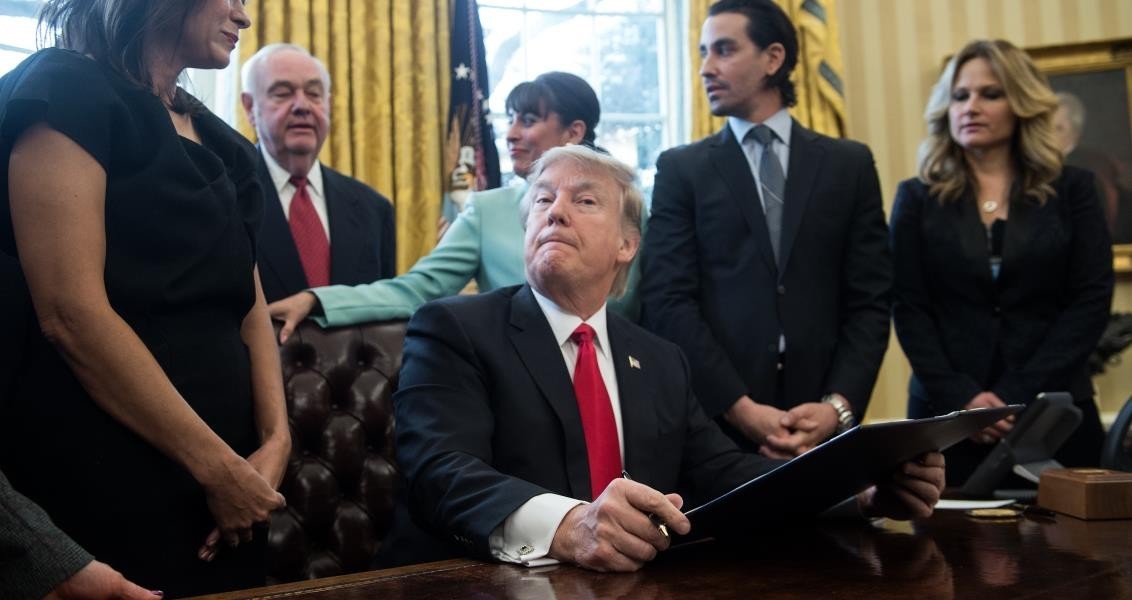A storm was already looming on the horizon when President Donald Trump assumed power in the U.S. As one of the least popular American presidents in recent history, citizens have protested against his protectionist, populist, xenophobic and far-right political platform. Indeed, less than one month into his term, Trump managed to create widespread “shock and awe” among the proponents of political, social and economic liberties in the U.S., as well as across the world. The fact that he swiftly started to realize his campaign promises to enforce economic protectionism, diplomatic isolationism, withdrawal from regional arrangements and restricting social movement signifies that the global system is entering a new phase. It seems that the U.S. might not be prepared to carry the burden of the public needs associated with its self-professed mission of “leading the free world” any more. A rich catalog of political and economic confrontations, which might result from the lack of relative “hegemonic stability,” is likely to be one of the hot topics of discussion in the coming months and years. However, more importantly from the perspective of the Muslim world, radical policy decisions taken by the Trump administration might herald a new era in which the already existing danger of anti-Muslim extremism in the Western world is elevated from the status of a marginal world view and social phenomenon to an element of official policy making.
When the freshly inaugurated U.S. president approved an executive order on Jan. 25 with the effect of suspending American refugee programs and banning the admission of citizens from seven Muslim countries for three months, the seriousness of the impending challenge was widely recognized for the first time. The executive order — which effectively stopped the allocation of visas to Muslim citizens of seven countries, including Iran, Iraq, Syria, Libya, Yemen, Somalia and Sudan, on the precept of preventing terrorism — sent shock waves through both the libertarian circles in the U.S. and the global public opinion in general. Strangely, some of the established U.S. citizens originating from these countries also experienced problems when entering the U.S. and rumors began to spread that the official list of countries whose citizens were deemed risky in terms of terrorism will be expanded soon. Although the executive order resembles previous debates concerning “fortress Europe,” which was justified on the basis of preventing domestic terror attacks, the fact that citizens of the listed countries were never involved in major terrorist attacks on U.S. soil was not taken into consideration. To make matters even worse, the scope of the order was specifically aimed at the Muslim citizens of the countries in question and excluded Christians and Jews originating from the same countries; therefore, representing a clear case of legal discrimination based on religious affiliation. Detentions and travel restrictions against innocent Muslim civilians started to be enforced at U.S. airports in a rush and with little preparation, resulting in chaos and provoked protests from legal professionals and NGO groups across the U.S. and around the world.
But for the careful observers following the long-term evolution of anti-Muslim extremism in the West, and the particular political agenda carried forward by political agents of the far-right in Europe and the Trump campaign in the U.S., the latest developments are hardly surprising. Anti-Muslim extremism as a social and political worldview that targets Muslim minorities in specific areas within Europe’s multicultural and diverse societies has been on the rise since the 9/11 attacks. It acquired additional momentum following the socioeconomic difficulties created by the global economic crisis in 2008. In recent years, far-right political movements propagating a broad agenda of anti-Muslim extremism formed extensive networks of cooperation in Europe and the U.S. with the support of certain think tanks, mass-media groups and academic institutions. These networks created political discourses based on distorted accusations of Muslim minorities as principal causes of major problems in Western societies. These discourses were then turned into hegemonic approaches via transfers from the margins to the mainstream public sphere. The natural outcome was widespread sociopolitical justification for the violations of fundamental human rights of Muslim citizens through bans on religious practices, attacks on mosques, anti-Muslim gatherings and physical harassment of Muslim women wearing hijabs.
It seems clear that U.S. foreign policy under President Trump will not attempt to maintain a moral high ground concerning the protection of fundamental human liberties or universal standards for religious freedoms. Whether the openly anti-Muslim policy approach will produce new conflicts and violence in the Middle East and elsewhere remains to be seen.
[Daily Sabah, February 6, 2017]
In this article
- Foreign Policy
- Opinion
- 2008
- 2017
- Anti-Islam
- Anti-Muslim
- Arabian peninsula
- Daily Sabah
- Donald Trump
- Europe
- Far-Right
- Human Rights
- Iraq
- Islamic Republic of Iran
- Islamophobia
- Jewish People
- Libya
- Libyan Crisis
- Middle East
- Muslim
- September 11 2001 Attacks | 9/11
- Somalia
- Syria
- Syrian Civil War
- Syrian Conflict
- Syrian Crisis
- Terror
- Terror Attack
- Terrorism
- Trump Administration
- United States (US)
- US Foreign Policy
- US President
- USA
- Western World
- Xenophobia
- Yemen
